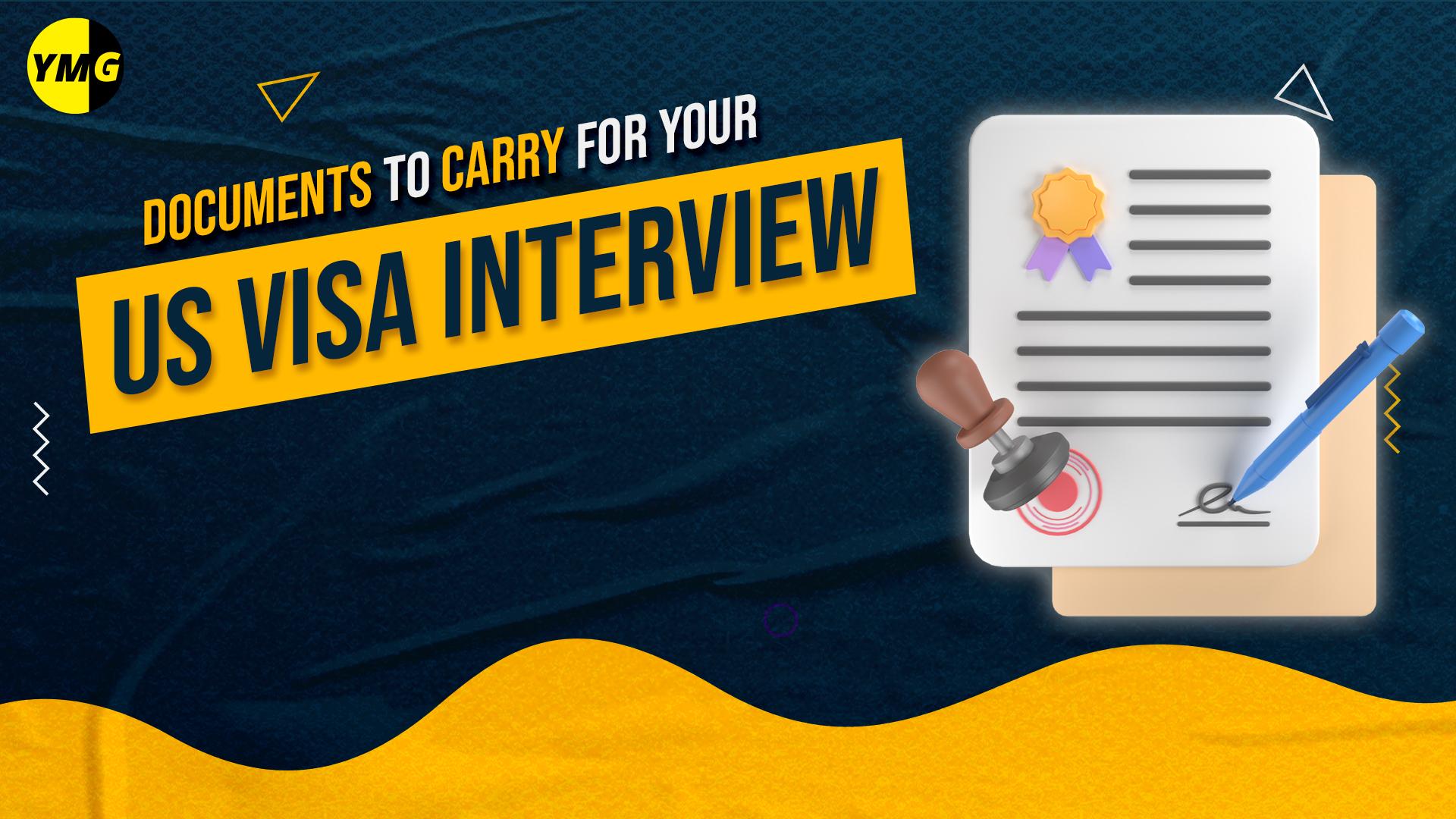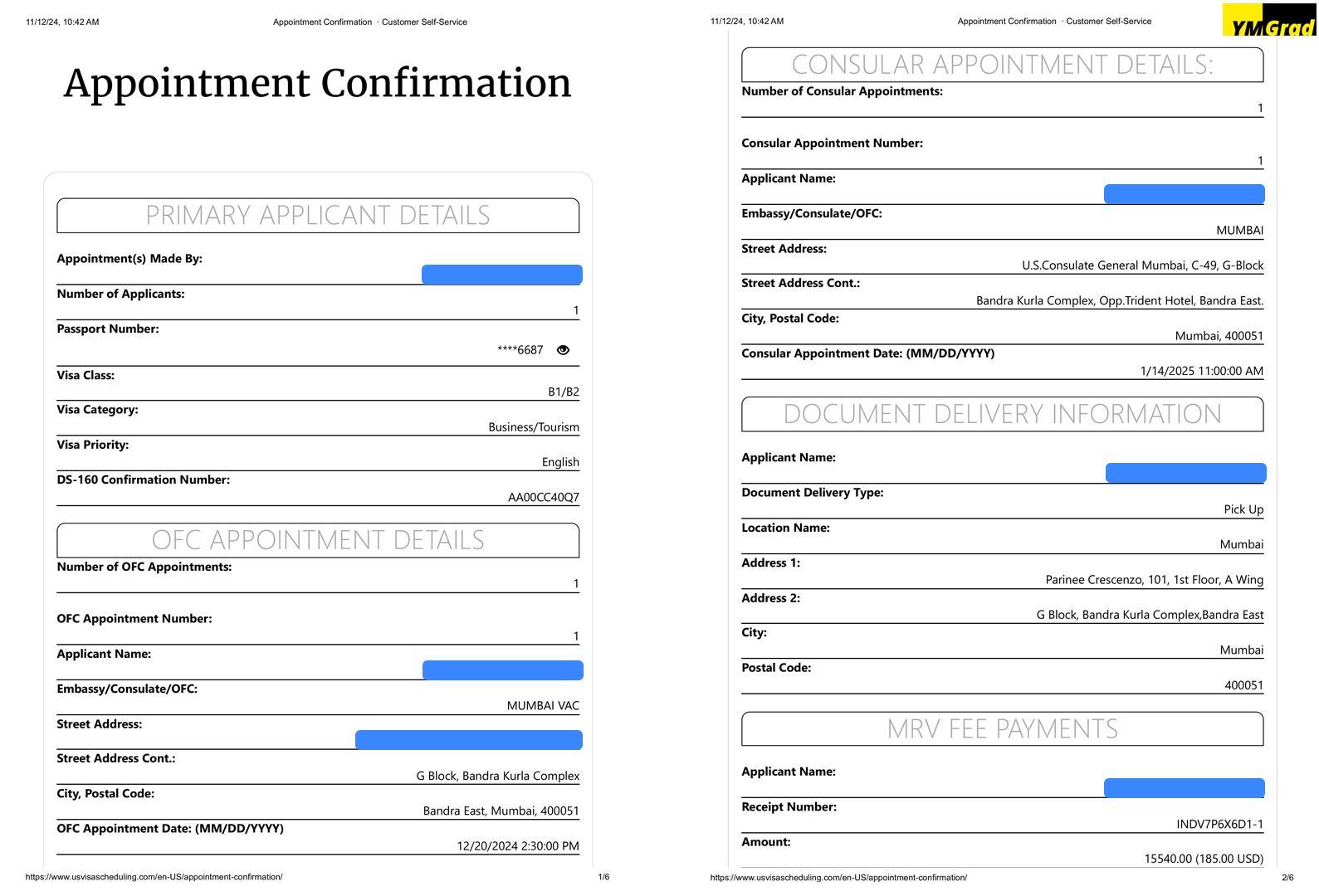Documents To Carry For Your US Visa Interview


If you are preparing for a US visa consular interview, making sure that you have the correct documents is a prerequisite. Missing paperwork can result in delays or even visa denial. Here is a whole guide to the documents you need to bring to your US visa interview.
Mandatory Documents
The documents you present to the consular officer serve as proof of your eligibility for the visa you are applying for. The list of required documents varies depending on the type of visa you are applying for. However, regardless of your visa type, the following documents are essential:
1. Passport
Bring your current passport and all previous passports.
The passport should be valid for at least eight months beyond your interview date.

2. Appointment Confirmation
This is your official proof that you have scheduled the visa appointment.

3. DS-160 Confirmation Page
The DS-160 is the online and non-immigrant visa application form. You must bring the printed confirmation page to your interview.

4. MRV Fee Receipt
Print the machine readable Visa (MRV) fee receipt and take it along with you.

5. DS-2019 Or Form I-20 for Students
If you are a student or exchange visitor applying for a US visa, you must carry either the DS-2019 or the form I-20.
The DS-2019 is required for applicants seeking a J-1 visa, which is used to exchange visitors, trainees, and interns.
The I-20 is essential for those applying for an F-1 or M-1 student visa, which is issued by SEVP-certified schools.
6. Photographs
While photographs may not be mandatory for OFC appointments in India, several other countries require applicants to provide passport-sized photos as part of their visa application process.
Nervous about your upcoming visa interview?
Get complete help filling your applications, securing your slot, and acing the interview.
Additional Documents
Proof of Relationship (For-Family Sponsored Visas)
Marriage Certificate & Divorce Decrees (If Applicable)
aIf married, bring your original marriage certificate and photocopy.
Form I-134 (Affidavit of Support)
Evidence of Financial Support
Military Records & Criminal History (If Applicable)
aIf you have served in the military or have been convicted of a crime, bring all related documents.
Medical Examination Report
Birth Certificate
Important Notes For Interview Day
Biometric Submission
You won't be interviewed unless you have submitted your fingerprints at the Visa Application Center (VAC).
Bring Photocopies
It is always best to carry photocopies of the required documents.
Check for Expired Documents
Ensure your police clearance, medical report, and financial documents are valid and up to date.
Connect With Us
A visa consular interview may sound intimidating, but being well-prepared can make a stark difference in your outcome. Beyond carrying the necessary documents, it is important to confidently articulate your purpose of travel, demonstrate your strong ties to your home country, and provide clear, honest answers to the consular officer's questions. Arrive early, dress professionally, and stay composed throughout the process.
Connect with our expert counselors to understand more about how to approach your visa interview with confidence and increase your chances of approval. Remember, staying prepared means already winning half the battle.
Frequently Asked Questions!

The fee that you paid is an application fee. Everyone who applies for a U.S. visa anywhere in the world must pay this fee, which covers the cost of processing your application. This fee is non-refundable regardless of whether you are issued a visa or not, since your application was processed to conclusion.

Yes, you will have to go through the whole visa application process each time you want to apply for a visa, even if your visa is still valid. There are some situations where a visa applicant may not need to be interviewed when renewing his/her visa. See the U.S. Embassy or Consulate website for more information.

You should contact the Immigrant Visa Unit of the U.S. Embassy or Consulate that issued your visa. You do not need to file a new petition with USCIS, but you may need to submit a new application (DS-260) and pay another immigrant visa application processing fee.

A visa does not guarantee entry into the United States. A visa allows a foreign citizen to travel to the U.S. port-of-entry, and the Department of Homeland Security U.S. Customs and Border Protection (CBP) immigration inspector authorizes or denies admission to the United States.

At the port of entry, upon granting entry to the United States, the Department of Homeland Security, U.S. immigration inspector, provides you an admission stamp or paper Form I-94, Arrival/Departure Record in your passport. On this admission stamp or paper Form I-94, the U.S. immigration inspector records either a date or "D/S" (duration of status). If your admission stamp or paper Form I-94 contains a specific date, then that is the date by which you must leave the United States.

If your passport with your admission stamp or paper Form I-94 are lost or stolen, you must get them replaced immediately. There are a number of steps you need to take, learn more, see Lost and Stolen Passports, Visas, and Form I-94s.

If your visa has been damaged in any way, you will need to reapply for a new visa at a U.S. Embassy or Consulate abroad.

Under U.S. law, specifically the Immigration and Nationality Act (INA) 222(f), visa records are confidential. Therefore, the visa applicant should inquire at the U.S. Embassy or Consulate abroad where he/she applied regarding necessary information about visa application status. Because of confidentiality of visa records, you’ll need to ask your friend, the visa applicant your questions about whether a visa application was made, or a visa was issued or denied.

There are more than 20 nonimmigrant visa types for people traveling to the United States temporarily. There are many more types of immigrant visas for those coming to live permanently in the United States. The type of Visa you need is determined by the purpose of your intended travel.

No. If the Department of Homeland Security, Customs and Border Protection Immigration Officer at the port-of-entry admitted you into the United States for a specific period of time, s/he will note your authorized period of stay on your admission stamp or paper Form I-94, called an Arrival/Departure Record. You will be able to remain in the United States during your authorized period of stay, even if your visa expires during the time you are in the United States. Since your admission stamp or paper Form I-94 documents your authorized stay and is the official record of your permission to be in the United States, it is very important to keep inside your passport.




